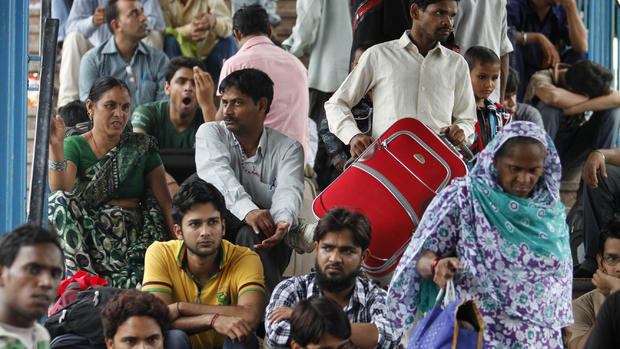India's power back on, for now
(CBS/AP) NEW DELHI - India's top electricity official says power has been restored across the country after a major system collapse led to the worst blackout in history.
An estimated 620 million people were without power after India's northern, eastern and northeastern grids cascaded into failure Tuesday afternoon.
Power Minister Veerappa Moily told reporters Wednesday morning that power had been fully restored.
The government has ordered an investigation into what caused the crisis.
Moily said he did not want to point fingers. Other officials said the crisis might have been caused by states drawing too much power from the grid but some analysts dismissed that explanation.
"I just can't believe that there is no system in place to check whether the states are drawing more than their limit or not," said Samiran Chakraborty, head of research at Standard Chartered, a financial services company. "There has to be a much more technical answer to that question."
At a contentious news conference, R.N. Nayak, chairman of Power Grid Corp., which runs the nation's power system, said his staff was searching for the cause of the problem and pleaded for patience.
"We have been running this grid for decades. ... Please trust us," he said.
The blackouts came amid consumer anger with the recent increase in power fees, including a 26 percent hike in Delhi, that government officials said were needed to pay for the steep rise in fuel costs.
The Confederation of Indian Industry said the two outages cost business hundreds of millions of dollars, though they did not affect the financial center of Mumbai and the global outsourcing powerhouses of Bangalore and Hyderabad in the south. Like many, the group demanded a widespread reform of India's power sector, which has been unable to keep up with the soaring demand for electricity as the economy expanded and Indians grew more affluent and energy hungry.
"India has outgrown its own infrastructure," said Jagannadham Thunuguntla, a strategist at SMC Global Securities.
India's Central Electricity Authority reported power deficits of more than 8 percent in recent months, and many economists said the power deficit is dragging down India's economy.
"Without power we cannot run an economy at 8 percent, 9 percent growth or whatever your ambition is," Chakraborty said.
Part of the problem is that India relies on coal for more than half its power generation and the coal supply is controlled by a near state monopoly that is widely considered a shambles.
A recent survey showed nearly all the coal-fueled plants had less than seven days of coal stock, a critical level, said Chakraborty, and many of the country's power plants were running below capacity. Government bureaucracy has made it difficult to bring more plants online.
In addition, vast amounts of power bleeds out of India's antiquated distribution system or is pirated through unauthorized wiring. Farmers, with a guarantee of free electricity that is driving many state electric boards to bankruptcy, have no incentive to conserve energy.
The power deficit was worsened this year by a weak monsoon that lowered hydroelectric generation, spurred farmers to use pumps to irrigate their fields long after the rains would normally have come and kept temperatures higher, keeping air conditioners and fans running longer.
While Indians were furious and embarrassed, many took the crisis in stride, inured by the constant - though far less widespread - outages triggered by the huge electricity deficit stymieing the development of this would-be Asian power.
"The blackout might have been huge, but it wasn't unbearably long," said Satish, the owner of a coffee and juice shop in central Delhi who uses only one name. "It was just as bad as any other five-hour power cut. We just used a generator while the light was out, and it was work as usual."
